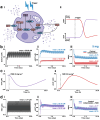Modulation of serotonin transporter expression by escitalopram under inflammation
- PMID: 38851804
- PMCID: PMC11162477
- DOI: 10.1038/s42003-024-06240-3
Modulation of serotonin transporter expression by escitalopram under inflammation
Abstract
Selective serotonin reuptake inhibitors (SSRIs) are widely used for depression based on the monoamine deficiency hypothesis. However, the clinical use of these agents is controversial, in part because of their variable clinical efficacy and in part because of their delayed onset of action. Because of the complexities involved in replicating human disease and clinical dosing in animal models, the scientific community has not reached a consensus on the reasons for these phenomena. In this work, we create a theoretical hippocampal model incorporating escitalopram's pharmacokinetics, pharmacodynamics (competitive and non-competitive inhibition, and serotonin transporter (SERT) internalization), inflammation, and receptor dynamics. With this model, we simulate chronic oral escitalopram in mice showing that days to weeks are needed for serotonin levels to reach steady-state. We show escitalopram's chemical efficacy is diminished under inflammation. Our model thus offers mechanisms for how chronic escitalopram affects brain serotonin, emphasizing the importance of optimized dose and time for future antidepressant discoveries.
© 2024. The Author(s).
Conflict of interest statement
The authors declare no competing interests.
Figures




References
-
- Friedrich MJ. Depression is the leading cause of disability around the world. JAMA. 2017;317:1517. - PubMed
-
- Hirschfeld RMA. History and evolution of the monoamine hypothesis of depression. J. Clin. Psychiatry. 2000;61:4–6. - PubMed
-
- Erritzoe, D. et al. Brain Serotonin Release Is Reduced in Patients With Depression: A [11C]Cimbi-36 Positron Emission Tomography Study With a d-Amphetamine Challenge. Biol Psychiatry10.1016/j.biopsych.2022.10.012 (2022). - PubMed
Publication types
MeSH terms
Substances
Grants and funding
LinkOut - more resources
Full Text Sources

